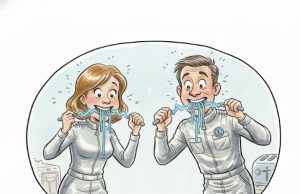You can prevent heart disease by following a heart-healthy lifestyle. Here are strategies to help you protect your heart.
Heart disease is a leading cause of d.e.a.t.h, but it’s not inevitable. While you can’t change some risk factors — such as family history, sex or age — there are plenty of ways you can reduce your risk of heart disease.
First, please avoid using the following 5 substances in excess to protect your heart and avoid a heart attack

1. Excessive intake of salt / consumption of uncooked salt
Excessive salt intake can lead to high blood pressure (hypertension), which stiffens and narrows the blood vessels. Blood and oxygen flow to key organs decreases. So the heart tries harder to pump blood throughout the body, which further increases blood pressure.
The element of salt is one of the most important in the kitchen. If you don’t salt your food, it will have no flavor. Despite this, caution should be given when it comes to the method in which it should be consumed. In its purest form, salt is made up of sodium chloride (NaCl), an extraordinarily strong chemical molecule that, when taken in large quantities, has a substantial tendency to constrict blood vessels. Uncooked salt is the most dangerous since it is still raw, and it will have a higher influence on the blood vessels than cooked salt due to the fact that it is still raw. As a result, people who consume excessive amounts of salt are more prone to develop high blood pressure. As a result of having high blood pressure, you may develop a number of other cardiac problems, all of which can lead to heart attack. Please, if you are concerned about your health, use salt in a sensible manner.
2. Avoid frequent consumption of fried foods and other foods that contains too much fats and oil
When we explained heart attack above, high cholesterol and fats deposits were said to be the major substances that block the blood vessels and muscles. As a result, every one of us must minimize the rate of consuming fatty foods, which includes foods that are fried and oil rich foods. On a special note, too much consumption of fatty foods affects the heart in unprecedented ways, it does not only weaken the heart but also restrict it from optimal blood pumping. To be on a safer side, you need be mindful of your body weight, and the rate at which you consume fried foods and other fats rich foods. If you can stay clear of high cholesterol and obesity, you arw sure that you have eliminated one of the major causes of heart attack.
3. Opioid drugs should be avoided (e.g Fentanyl, Codeine, Tramadol etc)
Every year, thousands of people lose their lives as a result of the absorption of a large number of opioid chemical compounds. They consume them in order to get energy and enthusiasm, completely oblivious to the hazards they cause to the heart, kidneys, liver, and other vital organs. It is intended for tramadol, codeine, fentanyl, and other opioid compounds to be used as analgesics in the treatment of medical diseases, and they are only intended to be used for a short period of time due to the possibility of dangerous side effects. The vast majority of people, on the other hand, are either completely unaware of this or have become addicted to them. Thank goodness this article arrived at the appropriate time. If you are concerned about your heart’s health and want to live a long and healthy life, you should avoid exposure to these substances unless you have a medical reason to do otherwise. Please don’t become one of the many people who have suffered heart attacks as a result of this.
4. Limit your carbohydrate intake and adopt a well-balanced diet.
Last but not least, you must break the habit of eating carbohydrates on a regular basis and replace it with a more balanced diet. Excess carbohydrates provide an energy boost to the body, but they deplete the body of other nutrients. It is not healthy for the heart to be in such a condition of affairs. A well-balanced diet is essential for the heart’s proper function and health. It is possible that consuming only carbohydrates would have no immediate negative implications, but it will have a long-term negative influence on your overall health. A well-balanced diet should be prioritized over junk food and consuming only one type of food at a time.
5. Limit your intake of alcoholic and soft drinks.
Many people wonder if alcohol can cause heart attacks, and for a good reason. Alcohol is a risk factor for heart attacks but does not usually cause a heart attack on its own. Short- and long-term alcohol use often have different impacts, but in general, an alcohol use disorder (alcohol addiction) indirectly contributes to a heart attack by:
Increasing blood pressure: As the kidneys work to correct the fluid that alcohol removes from the veins and arteries, the kidneys work to correct this imbalance by releasing proteins that tell the heart that your blood pressure is too low. Blood pressure increases to compensate.
Affecting diet habits: An established link exists between heavy alcohol use and poor diet because a person is not absorbing nutrients well, and they crave extra salt because of fluid retention. A salt-heavy diet is associated with an increased risk of a heart attack.
Affecting exercise habits: Alcohol use tends to impair the ability to exercise because of its effects of balance, coordination and fatigue. This fact further contributes to the risk of heart disease.
Alcohol’s Impact on Organs Increases Heart Attack Risk
It’s important to understand that alcohol indirectly increases the risk of heart attack by how it impacts the heart and several other important organs and processes in the body.
Alcohol and Heart Conduction
With alcohol in the bloodstream, the heart’s conduction can be affected because alcohol alters the balance of several neurotransmitters, including gamma-Aminobutyric acid (GABA), epinephrine, norepinephrine and serotonin. Neurotransmitters are molecules that carry messages between cells, and your myocardial cells use neurotransmitters to keep time and rhythm with the rest of the heart.
Heavy alcohol use has been linked to sudden cardiac death (SCD), especially in older men. During SCD, the heart cells cannot keep a regular rhythm, and this causes the heart to stop suddenly. While SCD is not the same as a heart attack, SCD is the largest cause of natural death in the United States. Automated external defibrillators (AED) treat this condition.
The same can be stated for carbonated beverages. The two most important elements in the soft drinks that we consume on a regular basis are sugar and carbon dioxide. Sugar causes blood sugar levels to rise, and as a result, diabetes develops. The presence of diabetes already increases a person’s chance of developing heart, kidney, and liver problems. If you make it a habit to avoid alcoholic beverages and sugary beverages, you will have fewer heart problems.
Source: operanewsapp.com



















